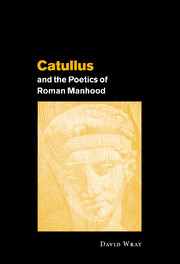2 - A postmodern Catullus?
Published online by Cambridge University Press: 08 October 2009
Summary
MAKE IT NEW.
Ezra PoundMAKE CATULLUS NEW
Everyone knows that “the Romans,” though perhaps closer to us than “the Greeks,” still were not like us, and that Catullus lived in “a world not ours.” Further, most professional readers of literature both ancient and modern have been persuaded by some version of the argument that a text is never fully extricable from its reception history, and that new critical attempts to get at ancient texts “as they really are” will consequently either introduce new critical misprisions or, more likely, recapitulate old ones. “All the new thinking,” precisely because it is “about loss” – about our irretrievable distance from the texts to whose study we are drawn by love, desire, nostalgia (but also by curiosity, appetite, delight) – inevitably in some measure “resembles the old thinking.”
Then again, it may be that the passing from one set of critical preconceptions to another, the superimposing of one paradigmatic grid over another, represents a privileged moment, one that offers us the clearest view we can hope to get, through the two competing trellises that almost cancel each other out, of the thing itself. If that insight, from The Order of Things, has any validity on the grand historical scale of Foucault's subject, then perhaps a somewhat new misreading of Catullus' poetry has the possibility of saying something right about it, at least in the way that a mot juste or a callida iunctura manages to say something right. Since the discussion has thus far been framed in the globalizing and generalizing terms of literary historical periodization (terms whose problems are evident enough), I may as well here explicitly characterize my project as an attempt to approach a premodern and preromantic Catullus by reading a postmodern Catullus.
- Type
- Chapter
- Information
- Catullus and the Poetics of Roman Manhood , pp. 36 - 63Publisher: Cambridge University PressPrint publication year: 2001



